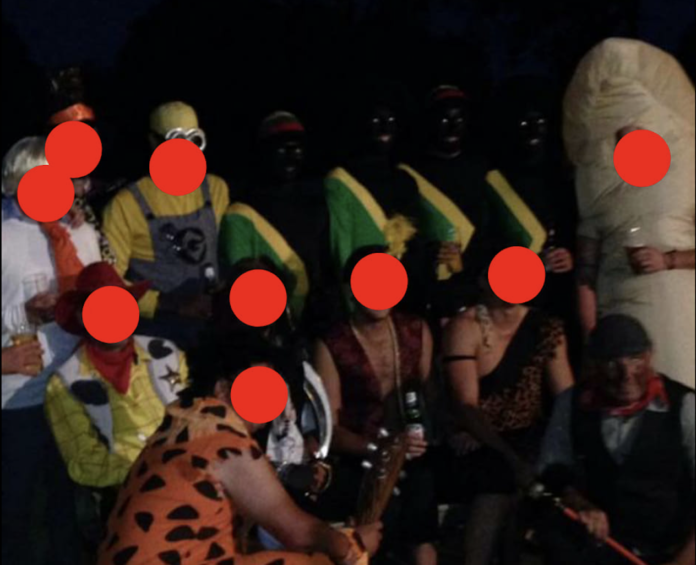LONDON: The England and Wales Cricket Board has launched an investigation after an Asian cricketer was subject to disciplinary measures for criticizing rivals who attended a party in blackface, and another player left his club over systemic racism.
Umar Razaq, of Siston Town Cricket Club, said four members of rivals Sileby Town Cricket Club dressed as the Jamaican Olympic bobsled team from the movie “Cool Runnings” at a fancy dress party in 2014.
Razaq, 31, posted an image of the four posing with Nigel Kinch, Sileby Town chairman and a member of the Leicestershire and Rutland cricket league, on Facebook, demanding an apology.
The post came after previous allegations of racist language used by a member of Sileby Town against Razaq resulted only in a short ban.
But instead of fresh action, Razaq said Kinch summoned him for a disciplinary hearing, accusing him of breaching social media policy.
Razaq told The Guardian: “This guy is the figurehead of the league of 38 teams. I just wanted him to acknowledge that blackface is wrong and to apologize publicly so that younger players coming through wouldn’t be put off.
“It was his party at his cricket club and he should have sent those boys home in disgrace, not had his picture taken with them. Excuses are being made for actions that are inexcusable.
“Last October I decided enough was enough when (the suspended member) returned to the club having called me a p– in the past and served only a short ban. I called for him to apologize on social media and I was trolled by people talking about white power.
“So I shared the photo of the party (taken in 2014) which was still up on a Sileby player’s Facebook page. An apology would have ended it. Instead, I was reported to the police for harassment, though that came to nothing, and called in for a disciplinary for breaching social media guidelines. I couldn’t believe it.
“Another Sileby player called a woman who messaged to support me the c-word on social media. There is clearly a worrying culture at that club, and it’s even more worrying that the chair is responsible for the league.”
A panel chaired by Leicestershire County Cricket Club CEO Sean Jarvis into the incident and the wider culture in the county invited Razaq to participate, and promised to “force through” change.
But Razaq said it amounted to “a box-ticking exercise. Still no apologies; Kinch still the chairman, (the member) still playing.”
A statement posted by Sileby Town Cricket Club, meanwhile, apologized to “any individual offended by the incidents … and any individual who feels they have experienced any form of discrimination from our club,” without mentioning specifics of what incidents it was referring to.
The case prompted Asian Sileby Town player Umar Afzal to leave, saying the culture of the club tolerated racism under the veneer of “banter” in the locker room.
“I now feel ashamed and angry with myself for not taking a stand earlier,” he said. “It was all so normalized I didn’t even realise how bad it was.
“One black player joined us and left after one game because of the constant racist stereotyping of him being a gangster and a drug dealer. A Filipino player was nicknamed ‘Yellow Man.’ Racism was like a disease at Sileby. It was just part of the culture.”
The ECB has since opened an investigation, with a spokesman saying: “As with any allegations of discrimination, Umar (Razaq’s) complaints must be investigated thoroughly.
“As these issues have not yet been resolved we will now be investigating and will also be providing independent support to find a resolution.”
Razaq welcomed the move, adding: “I’m relieved the ECB is taking this seriously as I have taken this all the way to the top of Leicestershire County Cricket Club and nobody has done anything.”
Asian players make up around a third of grassroots cricket in the UK, but allegations of racism aimed specifically at Asians in the game are not new.
Azeem Rafiq, who was forced to testify in front of a parliamentary select committee in 2021 over repeated racist incidents while playing for Yorkshire County Cricket Club, said Razaq “has been incredibly brave speaking out about his experiences. It’s increasingly clear that there needs to be investigations into the cultures of each county so as to get to the root of institutional racism in cricket.
“Again, we’re reading of a victim being abused and not heard. The game needs to change or we will lose a generation of aspiring cricketers.”
Razaq said: “My case has really mirrored Azeem’s. Like all Asian players at all levels, I had put up with years of racism because I wanted to play and racism was just part of the game that we all felt we had to tolerate. Like Azeem, people turned on me for calling racism out.”
A spokesperson for the UK’s Equality and Human Rights Commission urged cricket clubs to “examine what they are doing to tackle discrimination and harassment.”
Thomas Fletcher, a racism researcher at Leeds Beckett University, said cultural divides in cricket’s hierarchy made it harder to stamp out racism.
“There is a hierarchy of cultural acceptability in cricket. If you are Asian but you’ll join in, accept the casual racism, fit in, then you are accepted. At the other end, if you fast, don’t drink and challenge racism you’re branded a troublemaker, you’re excluded,” he added.
“It comes down to leadership. The senior coaching staff need to go into the dressing room and tell the players they need to welcome and embrace people from different backgrounds, take time to learn about their cultures.”
Kinch, Jarvis, Sileby Town, the Leicestershire and Rutland League and Leicestershire CCC did not respond to requests for comment.

